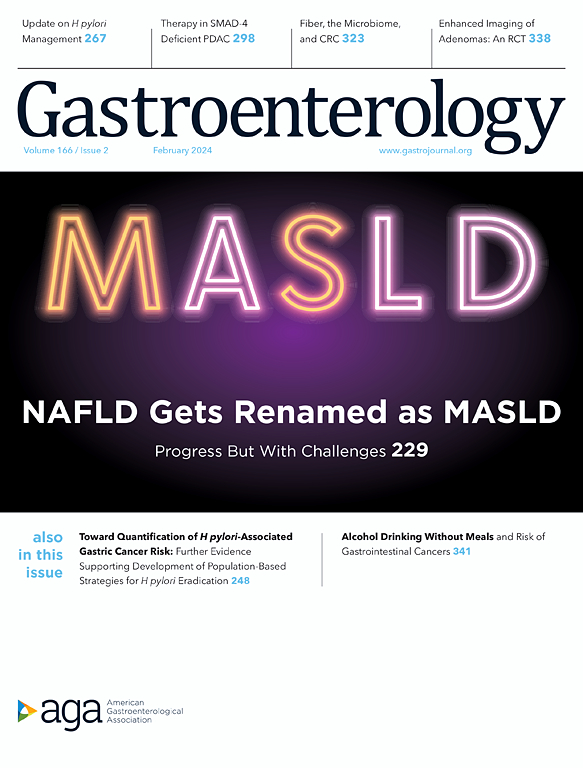Chemical perturbations impacting histone acetylation govern colorectal cancer differentiation
IF 25.7
1区 医学
Q1 GASTROENTEROLOGY & HEPATOLOGY
引用次数: 0
Abstract
BACKGROUND and AIMS
Aberrant epigenetic programs that suppress differentiation and enhance plasticity drive colorectal cancer (CRC), yet the molecular determinants underlying these processes remain elusive. We aimed to identify and characterize epigenetic regulators of CRC differentiation, uncovering mechanisms that reprogram cancer cell states.METHODS
A small molecule library targeting epigenetic regulators was screened using an endogenous dual reporter system. We evaluated lead compounds in mouse and human CRC models via histopathology, cellular assays, epigenetic studies, mass-spectrometry–based histone modification profiling, and single cell RNA-sequencing. Integrative analyses of drug-induced chromatin dynamics, gene expression, target engagement, and histone marks elucidated molecular mechanisms. Focused genetic screens were conducted to identify regulators of HDAC1/2-mediated differentiation.RESULTS
We found that inhibition of histone deacetylase (HDAC) 1/2 catalytic domain promotes CRC differentiation and suppresses tumor growth. Unbiased profiling of histone modifications identified H3K27ac and H3K9ac as critical regulatory marks, with genome-wide analyses demonstrating their enrichment at HDAC1/2-bound regions associated with open chromatin and upregulated differentiation genes. Disrupting H3K27ac by targeted degradation of acetyltransferase EP300 reversed the differentiation phenotype induced by HDAC1/2 inhibition in a patient-derived CRC organoid. Genetic screens revealed that DAPK3 contributes to H3K27ac-mediated CRC differentiation induced by HDAC1/2 inhibition.CONCLUSIONS
Our findings establish histone acetylation as a chemically targetable mechanism governing CRC cell fate and demonstrate that epigenetic reprogramming can be leveraged as a therapeutic strategy. By identifying HDAC1/2 inhibition as a driver of differentiation and revealing H3K27ac as a key regulatory mark, this study provides a framework for targeting chromatin-modifying enzymes to counteract CRC plasticity and improve treatment outcomes.影响组蛋白乙酰化的化学扰动控制结直肠癌的分化
背景和目的抑制分化和增强可塑性的异常表观遗传程序驱动结直肠癌(CRC),然而这些过程背后的分子决定因素仍然难以捉摸。我们的目的是鉴定和表征结直肠癌分化的表观遗传调控因子,揭示重编程癌细胞状态的机制。方法采用内源性双报告系统筛选表观遗传调控因子小分子文库。我们通过组织病理学、细胞分析、表观遗传学研究、基于质谱的组蛋白修饰谱和单细胞rna测序来评估小鼠和人类CRC模型中的先导化合物。药物诱导的染色质动力学、基因表达、靶标结合和组蛋白标记的综合分析阐明了分子机制。进行重点遗传筛选以确定hdac1 /2介导的分化调节因子。结果抑制组蛋白去乙酰化酶(HDAC) 1/2催化结构域可促进结直肠癌的分化,抑制肿瘤生长。组蛋白修饰的无偏性分析鉴定出H3K27ac和H3K9ac是关键的调控标记,全基因组分析表明它们在与开放染色质和上调分化基因相关的hdac1 /2结合区域富集。通过靶向降解乙酰转移酶EP300破坏H3K27ac,逆转了患者来源的CRC类器官中HDAC1/2抑制诱导的分化表型。基因筛选显示,DAPK3参与hac1 /2抑制诱导的h3k27ac介导的结直肠癌分化。研究结果表明,组蛋白乙酰化是控制结直肠癌细胞命运的一种化学靶向机制,并表明表观遗传重编程可以作为一种治疗策略。通过确定hdac /2抑制是分化的驱动因素,并揭示H3K27ac是关键的调控标志,本研究为靶向染色质修饰酶来抵消CRC可塑性和改善治疗结果提供了一个框架。
本文章由计算机程序翻译,如有差异,请以英文原文为准。
求助全文
约1分钟内获得全文
求助全文
来源期刊

Gastroenterology
医学-胃肠肝病学
CiteScore
45.60
自引率
2.40%
发文量
4366
审稿时长
26 days
期刊介绍:
Gastroenterology is the most prominent journal in the field of gastrointestinal disease. It is the flagship journal of the American Gastroenterological Association and delivers authoritative coverage of clinical, translational, and basic studies of all aspects of the digestive system, including the liver and pancreas, as well as nutrition.
Some regular features of Gastroenterology include original research studies by leading authorities, comprehensive reviews and perspectives on important topics in adult and pediatric gastroenterology and hepatology. The journal also includes features such as editorials, correspondence, and commentaries, as well as special sections like "Mentoring, Education and Training Corner," "Diversity, Equity and Inclusion in GI," "Gastro Digest," "Gastro Curbside Consult," and "Gastro Grand Rounds."
Gastroenterology also provides digital media materials such as videos and "GI Rapid Reel" animations. It is abstracted and indexed in various databases including Scopus, Biological Abstracts, Current Contents, Embase, Nutrition Abstracts, Chemical Abstracts, Current Awareness in Biological Sciences, PubMed/Medline, and the Science Citation Index.
 求助内容:
求助内容: 应助结果提醒方式:
应助结果提醒方式:


